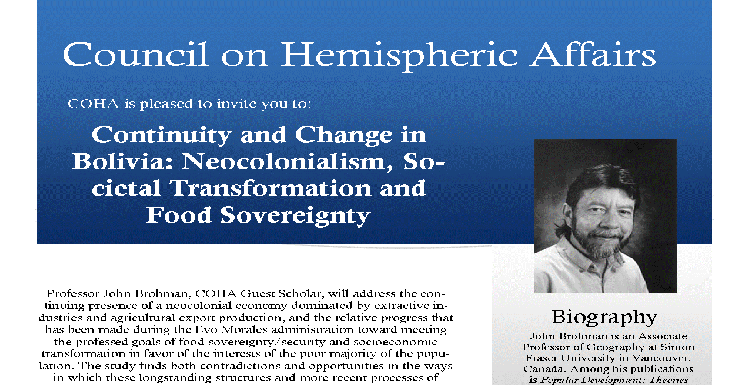Simon Fraser University’s Professor John Brohman Discusses Neo-colonialism, Societal Transformation, and Food Sovereignty in Bolivia at the Council on Hemispheric Affairs
Washington DC, April 30, 2014 (COHA) – On April 23, 2014 at the Washington Lecture Hall of the Council on Hemispheric Affairs (COHA), Professor John Brohman of Simon Fraser University in Vancouver Canada, offered a presentation pertaining to Bolivia’s contemporary social, political, and economic affairs. In Prof. Brohman’s presentation, titled “Continuity and Change in Bolivia: Neo-colonialism, Societal Transformation, and Food Sovereignty,” he discussed community economic development as an alternative to Bolivia’s economic development model now being featured by the current administration of President Evo Morales. This unique approach, Brohman maintained, could serve as a tactical departure away from an existing neo-colonial economy in Bolivia, which is today largely based on extractive industries.
Professor Brohman’s work combines research and clinical applications regarding development projects, the last phase of which was conducted in Bolivia during a period of 6 years under the title, “Bolivian specialization in community economic development.” His passion and interest in development has led him to research far-ranging topics such as regional development and planning, rural development and agrarian reform, linkages between industry and agriculture, commercialization networks, institutional and organizational aspects of the Third World state, and neoliberal development strategy and alternative development strategies. Some of Brohman’s writings on the subject include Popular Development: Rethinking the Theory and Practice of Development, The agroexport model and nontraditional exports in Central America: deja vu or something new? and Universalism, Eurocentrism, and ideological bias in development studies: from modernization to neoliberalism.
Bolivia’s economy has been overwhelmingly based on resource extraction, with natural gas and oil filling serving as the most important pillars in the national economy (previously, minerals like tin and silver played a comparable role). An alternative to this model, according to Professor Brohman, would be an economy aimed at reducing food imports, expanding food production, including its commercialization, and one focused on advocating for small and medium producers. Central to this alternative model is achieving food sovereignty, a process that is fundamentally at odds with a food security approach. According to Professor Brohman, while food security is “based on the corporate/neoliberal food regime, which stresses food aid, agribusiness growth and large-scale, capital-intensive technological development,” food sovereignty represents a “reaction to the neoliberal food regime,” challenging agricultural monoculture, capital/energy-intensive industrial agriculture, and environmental degradation.
As Brohman is careful to explain, a food sovereignty approach pays acute attention to the environment, land ownership, rural, and culture, small-medium campesino production, agro-ecological technologies, and sustainability. Although “the dynamics of food sovereignty have gained strength in Bolivia,” and despite the fact that food sovereignty is highlighted both in the 2009 Constitution and the government’s National Development Plan, Brohman concludes that Bolivia needs to make significantly more progress to attain substantial additional food sovereignty. As pointed out by Prof. James Petras, former Sociology Professor at Binghamton University, agribusinesses in Bolivia receive subsidies and tax exemptions, while “land-reform for landless peasants was relegated to marginal public lands.”[i] Thus, although Bolivia has witnessed impressive improvements in figures linked to economic growth, rates of inequality, rates of poverty, education and literacy, Professor Brohman stresses that, “The neo-colonial economic model of resource extraction and agro-export production has been continued and reinforced under Morales.” In fact, this model has allowed the government to “accelerate socioeconomic transformation for the poor indigenous majority.” As Petras explains, “The most striking aspect of the eight year rule of Evo Morales is his rigor and consistency in upholding orthodox economic policies – right out of the handbook of the international financial organizations,” which has allowed the country to maintain a growth between 4% and 6%.[ii]
The Gini coefficient, a measurement of inequality ranging from 0 (perfectly equal) to 1 (perfectly unequal), has decreased from about 0.60 in 2005 to 0.50 in 2009. The overall poverty rate, explains Brohman, has decreased from about 61% in 2005 to 51% in 2009, and extreme poverty decreased from 38% to 26% in 2009. Nevertheless, the gap between the rural and urban population is still wide. In 2009, the overall poverty rate for the urban population was 44%, while it reached 66% of the rural population; extreme poverty affected 16% of the urban population while 45% of the rural population lived in extreme poverty.
Therefore, although it may seem contradictory to abandon an economic system that has allowed the landlocked Andean state to invest in and achieve considerable high levels of societal transformation and economic growth, the Bolivian government still needs to evolve into an economic system that allows Bolivia to achieve higher equality, food sovereignty, and sustainability.
References:
[i] Petras, James. “Bolivia under Morales,” Dissident Voice, December 31, 2013. http://dissidentvoice.org/2013/12/bolivia-under-evo-morales/
[ii]Ibid.


